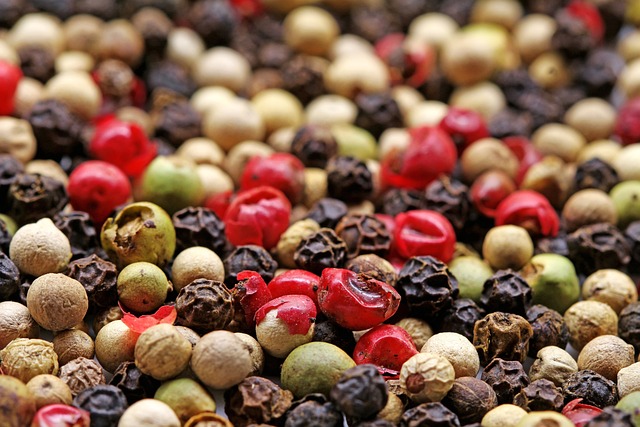Contents
A Comprehensive Guide to Using White Pepper as a Seasoning
White pepper, also known as “King of Spices,” is a versatile seasoning that can elevate the flavor profile of various dishes. While often overlooked when compared to its popular counterpart, black pepper, white pepper holds its own unique characteristics and benefits in the culinary world. This comprehensive guide will introduce you to the diverse uses and advantages of using white pepper as a seasoning.
Benefits of White Pepper:
- Enhances Taste: White pepper adds a distinct and slightly floral flavor to dishes, enhancing the overall taste experience.
- Ideal for Light-colored Dishes: Unlike black pepper, white pepper is perfect for light-colored dishes such as white sauces, mashed potatoes, or cream-based soups without leaving dark specks.
- Digestive Aid: White pepper has been traditionally used as a digestive aid and can help stimulate digestion, alleviate gas, and relieve gastrointestinal discomfort.
- Anti-inflammatory Properties: Studies suggest that white pepper contains anti-inflammatory properties that may help reduce inflammation in the body.
- Rich in Antioxidants: Similar to other peppers, white pepper is a good source of antioxidants that can protect the body against harmful free radicals.
How to Use White Pepper:
White pepper can be used ground or whole, depending on the desired intensity. Use the following tips to incorporate white pepper into your culinary creations:
- In Soups and Sauces: Add a pinch of white pepper to soups, stews, gravies, and sauces to impart a subtly spicy and aromatic flavor.
- In Light-colored Dishes: Sprinkle ground white pepper into light-colored dishes, ensuring an even distribution of flavor without affecting appearance.
- In Marinades and Rubs: Combine white pepper with other spices and herbs to create flavorful marinades and rubs for meat, poultry, and seafood.
- In Stir-fries and Noodles: Enhance the taste of stir-fried vegetables or noodle dishes by incorporating white pepper during the cooking process.
- In Baked Goods: Surprisingly, a small pinch of white pepper can elevate the flavors of certain baked goods like bread, biscuits, or cookies.
By experimenting and incorporating white pepper into your cooking repertoire, you will discover its ability to enhance flavors and impart a unique touch to your culinary creations. Whether used in savory or sweet dishes, white pepper can undoubtedly add a delightful twist to your meals.
1. What is White Pepper?
White pepper is a popular spice used in various cuisines around the world. It is derived from the same plant as black pepper, but the berries are allowed to fully ripen before they are harvested. The outer layer of the berries is removed, leaving behind the inner seed, which is then dried and ground to create white pepper.
2. Culinary Uses of White Pepper
2.1 Seasoning Soups and Sauces
White pepper adds a unique and delicate flavor to soups and sauces. It can be used in both clear and creamy soups to enhance the overall taste. When added to sauces, it blends well with other spices and ingredients to create a balanced and savory flavor profile.
2.2 Meat and Poultry
White pepper is a common seasoning for meat and poultry dishes. Its subtle spiciness complements the natural flavors of the meat without overpowering them. It can be used in marinades, rubs, or simply sprinkled over the meat before cooking.
2.3 Vegetables
Adding a touch of white pepper to vegetable dishes can elevate the taste profile. It adds a hint of spiciness without overwhelming the natural flavors of the vegetables. For best results, try using it in stir-fries, roasted veggies, or even in creamy vegetable-based soups.
3. Health Benefits of White Pepper
White pepper offers several potential health benefits. It contains an active compound called piperine, which has been linked to various health-promoting properties. Some potential benefits include:
- 1. Anti-inflammatory properties
- 2. Digestive aid
- 3. Antioxidant effects
- 4. Anti-cancer properties (in preliminary studies)
4. Tips for Using White Pepper
To make the most of white pepper as a seasoning, consider the following tips:
- 1. Start with a small amount and adjust according to taste.
- 2. Use freshly ground white pepper for maximum flavor.
- 3. Store white pepper in an airtight container away from heat and light to preserve its freshness.
- 4. Experiment with combining white pepper with other spices to create unique flavor profiles.
5. Conclusion
White pepper is a versatile and flavorful spice that can enhance a wide range of dishes. Whether used in soups, sauces, meats, or vegetables, its subtle spiciness adds a layer of complexity to the overall flavor profile. Additionally, white pepper offers potential health benefits, making it a great choice for both culinary and wellness purposes. So, next time you’re looking to add some extra flavor to your meals, don’t forget to reach for the white pepper!
Related Posts:
Frequently Asked Questions
What is white pepper?
White pepper is a spice derived from the same pepper plant as black pepper (Piper nigrum). It is made from the matured berries of this plant that have been soaked in water and then had their outer skin removed, resulting in a milder and less pungent flavor compared to black pepper.
How is white pepper used as a seasoning?
White pepper is commonly used as a seasoning in various cuisines around the world. It can be added to soups, stews, sauces, marinades, and rubs to enhance the flavor of dishes. Since it has a milder taste, it is often preferred in dishes where a subtle pepper flavor is desired.
What are the advantages of using white pepper over black pepper?
Using white pepper instead of black pepper can be advantageous in certain dishes. The milder flavor of white pepper allows other ingredients to shine, without overpowering the dish. Additionally, white pepper is visually less noticeable in light-colored dishes, making it a preferred choice in certain recipes.
Are there any health benefits associated with white pepper?
White pepper, like black pepper, contains a compound called piperine, which has been found to have potential health benefits. These include improving digestion, boosting metabolism, and acting as an antioxidant. However, it’s important to consume white pepper in moderation as excessive intake may lead to digestive issues in some individuals.
Can white pepper be used as a substitute for black pepper?
White pepper can generally be used as a substitute for black pepper, but the two do have slightly different flavors. While black pepper has a more intense and robust taste, white pepper has a milder and slightly earthier flavor. The choice of whether to use white or black pepper ultimately depends on personal preference and the specific dish being prepared.
How should white pepper be stored?
To maintain its flavor and quality, white pepper should be stored in an airtight container away from direct sunlight and heat. It is best to keep it in a cool and dry place, such as a pantry or spice cabinet. When stored properly, white pepper can retain its flavor for up to three years.
Enhancing Flavor and Aroma with White Pepper
What is White Pepper?
White pepper, also known as Piper nigrum, is a common spice found in many cuisines worldwide. It is derived from the dried and ripe fruit of the pepper plant which is then processed to remove the outer black layer, leaving behind the inner white seed.
Uses of White Pepper
White pepper is often used as a seasoning in various dishes, adding a distinct flavor and aroma. It is commonly found in soups, sauces, marinades, and dressings. Due to its milder taste compared to black pepper, it is preferred by those who desire a subtle heat without overwhelming the dish.
White pepper can be used in both savory and sweet recipes, and it blends well with other herbs and spices. Many recipes, especially those from Asian cuisines, call for white pepper to enhance the overall taste and provide a unique flavor profile.
Health Benefits of White Pepper
Aside from its culinary uses, white pepper also offers several health benefits. It contains bioactive compounds such as piperine, which has antioxidant and anti-inflammatory properties.
Some potential health benefits of white pepper include:
- Improved digestion: White pepper has been known to support digestion by stimulating the production of digestive enzymes in the stomach.
- Anti-inflammatory effects: The antioxidant properties of white pepper may help reduce inflammation in the body.
- Weight management: Studies have suggested that consuming white pepper may aid in weight management by increasing metabolism and promoting fat breakdown.
Using White Pepper in Cooking
When cooking with white pepper, it is important to use it sparingly and adjust the amount according to your taste preferences. It is generally recommended to add white pepper towards the end of the cooking process to preserve its delicate flavor.
To experience the full flavor of white pepper, it is advisable to freshly grind it using a pepper mill. This ensures that the essential oils and aroma are released just before incorporating it into your dish.
If you want to learn more about white pepper, you can visit the Wikipedia page on white pepper.
Introduction
- Overview of white pepper and its culinary uses
- Explanation of the differences between white and black pepper
Benefits of White Pepper
- Enhances flavors without overpowering
- Offers a unique aroma and heat
- May have health benefits
- Can aid digestion
- May have antibacterial properties
Using White Pepper in Different Dishes
Soups and Sauces
- How to incorporate white pepper in soups
- Pairing white pepper with various sauces
Meat and Poultry
- Marinating meats with white pepper
- Adding white pepper to poultry recipes
- Suggestions for seasoning steaks, burgers, and more
Vegetables and Salads
- Ways to enhance vegetable dishes with white pepper
- Using white pepper in salad dressings
Tips and Precautions
- Proper storage methods for white pepper
- Caution when using white pepper in spicy dishes
- How to balance white pepper’s intensity in recipes








































